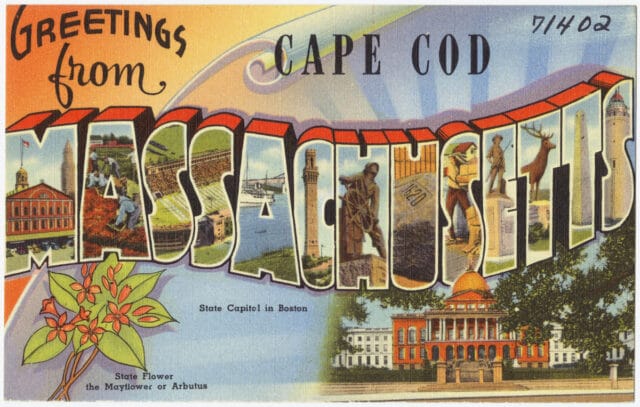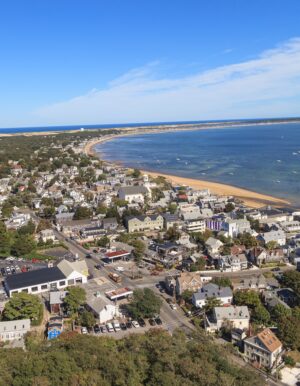It appears that the demise of the Cape Cod hotel industry due to the pandemic has been greatly exaggerated.
If anything, many industry figures say the Cape lodging sector is emerging stronger than ever, thanks to a boom in leisure travel by now mostly vaccinated residents determined to get out of the house and enjoy life without protective masks, social distancing and fears they’ll be exposed to the coronavirus from the person dining, barbecuing or sunbathing next to them.
The story is a contrast from hotels that rely heavily on business travel and conventions in cities like Boston, where hotels are expected to limp along for a while longer with room prices, occupancies and valuations well below pre-pandemic levels.
“Without a doubt, it’s going to be much stronger,” Scott Hutchinson, first vice president in the capital markets group at CBRE, said of the tourist-driven hotel business both on the Cape and across the nation this summer and perhaps beyond.
“I’m pleasantly surprised how well they’re doing,” said Sebastian Colella, vice president of Pinnacle Advisory Group, a Boston-based hotel asset management group. “The Cape [hotel sector] is doing fine.”
A Rebound for Room Rates
The numbers confirm the optimism that the Cape hotel market has not only rebounded to pre-pandemic levels but, by many measures, is now exceeding them.
According to early-spring data provided by Colella, average daily room rates on the Cape were hovering around $135 in March, compared to $120 during the same month in 2019, before the pandemic. Meanwhile, the revenue per available room (RevPAR) on the Cape was $38 in March, compared with $34 in March 2019. Occupancy rates during the two years are about the same.
By comparison, average daily room rates in the Boston/Cambridge market were $136 in March, down 40 percent from the same month in 2019, Colella said. The RevPAR for Boston/Cambridge hotels was $40 in March, down a whopping 80 percent from $181 in the same month in 2019.
“Compared to the Cape, it’s going to be a long road to recovery in Boston,” Colella said.
All signs point to the Cape numbers growing steadily stronger this summer.
Wendy Northcross, the chief executive of the Cape Cod Chamber of Commerce, said most hospitality executives on the Cape were hoping this year to just match 2020’s surprisingly robust numbers. So far, all anecdotal evidence – including reports of advance bookings, room availabilities and prices – indicates that hotels in all categories will fare better than in 2020 and 2019, she said.
“Demand is very, very strong,” she said. “It’s been crazy. At the start of the year, the rush to book rooms started earlier than normal and it hasn’t let up since. It’s a very tight market.”
The only statistic not available to confirm the positive trend is hotel valuations, but that could change soon if investors who are now “kicking the tires,” as one industry source put it, actually start snapping up hotel properties on the Cape.

A revival of summer travel already shows signs of benefiting Cape Cod’s hotel industry as leisure markets prepare for the annual influx of vacationers. Photo courtesy of the Boston Public Library | CC BY 2.0
Investment Sales Market Murky
“I would argue valuations are going to be good, or better, than they’ve been in the past,” said Alan Suzuki, managing director of capital markets at JLL in Boston. “There’s a lot of capital on the sidelines.”
There are drawbacks to the Cape that may yet discourage some investors from jumping into the market.
First, the Cape still remains a largely seasonal market, a limitation that hurts overall revenue performance. Second, the Cape is still made up of mostly older, family-owned properties that need a lot of money to refurbish and reposition them in order to attract higher-paying guests. Third, the Cape’s chronic summer labor shortages, with this summer being no exception, is a turnoff for some investors who don’t want to scramble to staff properties, industry executives said.
From an investment standpoint, another plus for the Cape market is its high barrier-to-entry reputation due to strict zoning codes that discourage new commercial construction. In other words: Supply, to a large extent, is capped.
CBRE’s Hutchinson said he has a number of clients looking to sell their hotel properties.
The chamber’s Northcross says she’s also hearing from commercial property owners and bankers that investors are looking for real estate deals.
Phil Baxter, owner of Baxter Hospitality, is one of those investors on the prowl. Two years ago, his start-up hotel company purchased an East Dennis motel property and repositioned it into the 21-room, four-building Sesuit Harbor House, which he described as a “mini-resort.”
Last year, the Sesuit Harbor House had a “pretty successful summer,” enough for him to proceed this year with the purchase of the old Compass Rose Inn in Yarmouth Port. After ongoing renovations are completed, Baxter said he’s hoping to open the renamed, 21-room Chapter House in June.
And he’s hoping to perhaps snap up more properties. His goal: To eventually sell his properties to larger institutional investors.
“That’s the exit strategy,” said Baxter, a native of the Cape who has worked for years in the hotel industry across the country. “There’s a lot of money chasing repositioned hotels – and that’s what we’re doing.”
Marketing Push Targets Eco-Tourists
Not all Cape hoteliers are assuming guests will beat a path to their doors in an inevitable spike in lodging demand.
Eric Shapiro’s Lexvest Group owns three lodging properties on the Cape – the 26-room Breakwater Hotel and 57-room Cape Colony Inn, both in Provincetown, and the 11-unit Truro Beach Cottages. So far, he hasn’t seen bookings exceed pre-pandemic levels, though they’re getting close to 2019 levels, he said.
Trying to take advantage of the pandemic-era demand for more outdoor activities, Shapiro said Lexvest this year has started a new eco-tourism company, Outer Cape Tours & Concierge Services, which will give guided tours of Cape beaches, forests and historic sites. The service will be free to hotel guests and open to all other paid customers, he said.
“It’s an added amenity,” he said. “The pandemic is what finally started it – with people spending more time outdoors. It’s a way to differentiate us from rivals. Also, we hope it boosts our off-season business.”




 |
| 
